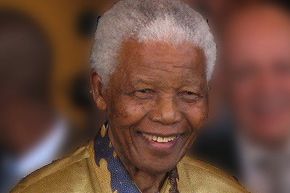 In a letter sent Friday to Derek Hanekom, the South African minister of science and technology, TWAS Executive Director Romain Murenzi hailed Mandela as a man of "rare courage and understanding". His fight against apartheid cleared the way for all South Africans to seek science education and careers in research, Murenzi said, and the new generations of scientists and engineers have propelled the nation to the forefront of Africa's research enterprise.
In a letter sent Friday to Derek Hanekom, the South African minister of science and technology, TWAS Executive Director Romain Murenzi hailed Mandela as a man of "rare courage and understanding". His fight against apartheid cleared the way for all South Africans to seek science education and careers in research, Murenzi said, and the new generations of scientists and engineers have propelled the nation to the forefront of Africa's research enterprise.
TWAS's sentiments were echoed in an outpouring of praise and sympathy Friday from the African and global scientific community.
Mandela died Thursday night at his home in Johannesburg, at the age of 95. For nearly a half-century, apartheid served as a rigid system of racial segregation that strictly limited rights and opportunities for black and other non-white South Africans. Mandela's iconic campaign to bring the system down led to a 27-year term in prison.
With South Africa under mounting international condemnation, Mandela was freed in 1990. He negotiated an end to apartheid with President Frederik Willem de Klerk, and in 1993, the two men shared the Nobel Peace Prize. A year later, Mandela was elected South Africa's first black president. He guided the nation through a challenging period of transition, working to heal the profound mistrust and anger left in the apartheid's aftermath.
TWAS, founded in 1983, has long had close relations with South Africa. Nineteen of the Academy's elected members are South African, and its annual international meeting was held in Durban, South Africa, in 2009. Earlier this year, Hanekom announced that South Africa would work with TWAS to offer some 100 fellowships to students from developing countries to pursue their PhDs in South Africa.
"It is with deep sadness that we learned last night of the passing of former President Nelson Mandela," Murenzi said in his letter to Hanekom. "On behalf of TWAS members throughout the world and our staff in Italy, I offer heartfelt condolences to the science community of South Africa and to all the people of your nation.
"As a leader and then as president, Mandela was a powerful source of inspiration for scientists, engineers and educators in Africa and throughout the developing world. Through his historic campaign to break the chains of apartheid, he made it possible for young South African men and women of every colour to dream of, and pursue, a life in scientific research. He famously declared that education is 'the most powerful weapon with which you can change the world', and this message has resonated among researchers everywhere.
"Today, so many South Africans are working and succeeding in the fields of research that your nation has emerged as Africa's science leader. Its potential is vast. Its future is bright. This is, without doubt, a testament to Mandela's vision.
"We have lost a man of rare courage and understanding," Murenzi concluded. "But if the world's science community is guided by Nelson Mandela's energy and commitment to improving life for all people, I know that his legacy will live on for many generations, with great benefits for humanity."
Edward W. Lempinen

